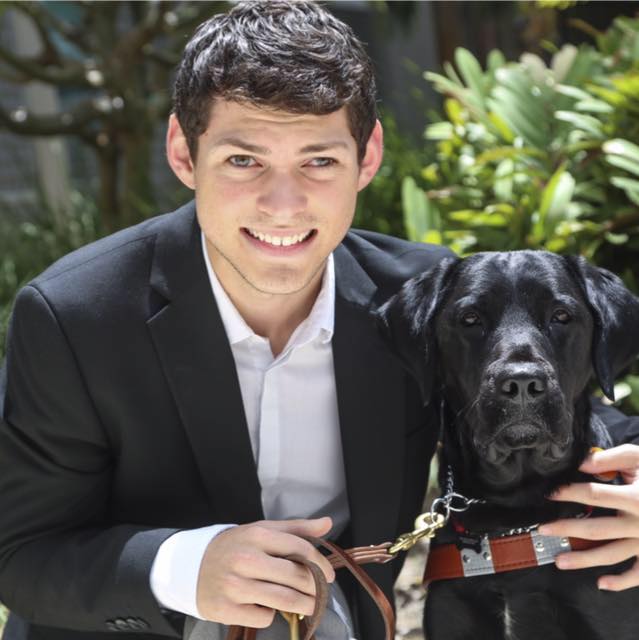Joseph Chica has a visual impairment from a hereditary disease that causes progressive vision loss. He relies on his service dog, Gunner, for daily navigation. But with the influx of both personal pets on campus and emotional support animals – which are not protected under the Americans with Disabilities Act – Chica has to work to keep Gunner from getting distracted by other dogs and people.
“People will go, ‘Oh look a dog,’ and bring their dog up to my dog,” Chica said. “All of the sudden my dog pulls to the left, and I have no idea what’s going on.”
This is just one of the many hurdles that Chica, a sophomore majoring in music and economics, has to overcome regularly. But he doesn’t let it get him down – he prefers to be a source of motivation for others, often speaking at the Miami Lighthouse for the Blind and trying to lead by example.
Chica got his service dog Gunner three years ago in preparation for going away to college. Before working with Gunner, he used a cane to get around. He said having a service animal feels like a more socially acceptable way of getting around because with a cane, you have to hit things to know they’re there. Instead of people moving away to avoid getting hit by a cane, a dog can bring in people.
“It was a cool transition,” Chica said. “Before I decided to get him, I became a guide dog fanatic. I read every story about guide dogs possible. I considered every situation. I expected to get more attention with a dog. But instead, he gets all of the attention, people will walk by me and just say, ‘Hey Gunner.’”
The lack of education and awareness the general population has about working dogs can cause a lot of difficult situations for Chica, he said.
“There will be times where I’ll turn around and, all of a sudden, he’ll be on the ground because someone’s petting him,” Chica said. “I’m like, ‘What are you doing? He’s working.'”
The three things Chica would recommend to everyone are to always have dogs on a leash, always ask the owners if it’s OK before interacting with a dog and know your animal enough to understand how they will behave. He said without a leash, at the end of the day, you don’t have any control over their actions. Be realistic about what your dog needs to behave well and what situations they can handle.
In general, Chica is happy to answer questions and educate people about what his dog can do.
“The most common misconception is that I can just say, ‘Gunner, Starbucks, and he’ll just walk and go to Starbucks,” Chica said. “That’s not how it works at all.”
There is an application process in order for a visually-impaired person to receive a guide dog, and to be considered, the applicant must have mobility training, meaning he or she can independently cross the street and do other tasks alone. The dogs don’t have the ability to fully tell when it’s safe to cross the street, so their owners have to tell the dogs when it’s safe to cross. The dogs help with walking in a straight line, avoiding obstacles and getting over curbs.
While Chica relies on Gunner for some of his independence and mobility needs, he recognizes that there is a lot of service animal fraud that undermines his needs. He said he once attended the Coconut Grove Art Festival, which clearly noted at the entrance that only service animals were allowed. However, there were approximately 50 animals there, some with “service animal” vests available for purchase online. These animals were clearly not service animals as they were misbehaving – barking and relieving themselves, Chica said.
Besides what comes with having a service animal, Chica said he faces daily challenges from having a visual impairment, and Gunner can’t always help.
“I’ve been going to the dining hall and I’m like, ‘Man I want my cookies,’” Chica said, after he couldn’t find cookies where they normally are, near the refrigerated desserts. “One day, I bring my girlfriend to the dining hall, and she’s like, ‘Oh, by the way, they moved the cookies over here.’ I would have never known that.”
If you’re interested in learning more about service animal training, U PUP is a student organization that teaches students training methods and raises awareness about service dog etiquette. Form more information, U PUP President Jamie Tryba can be reached at jtryba@miami.edu.







